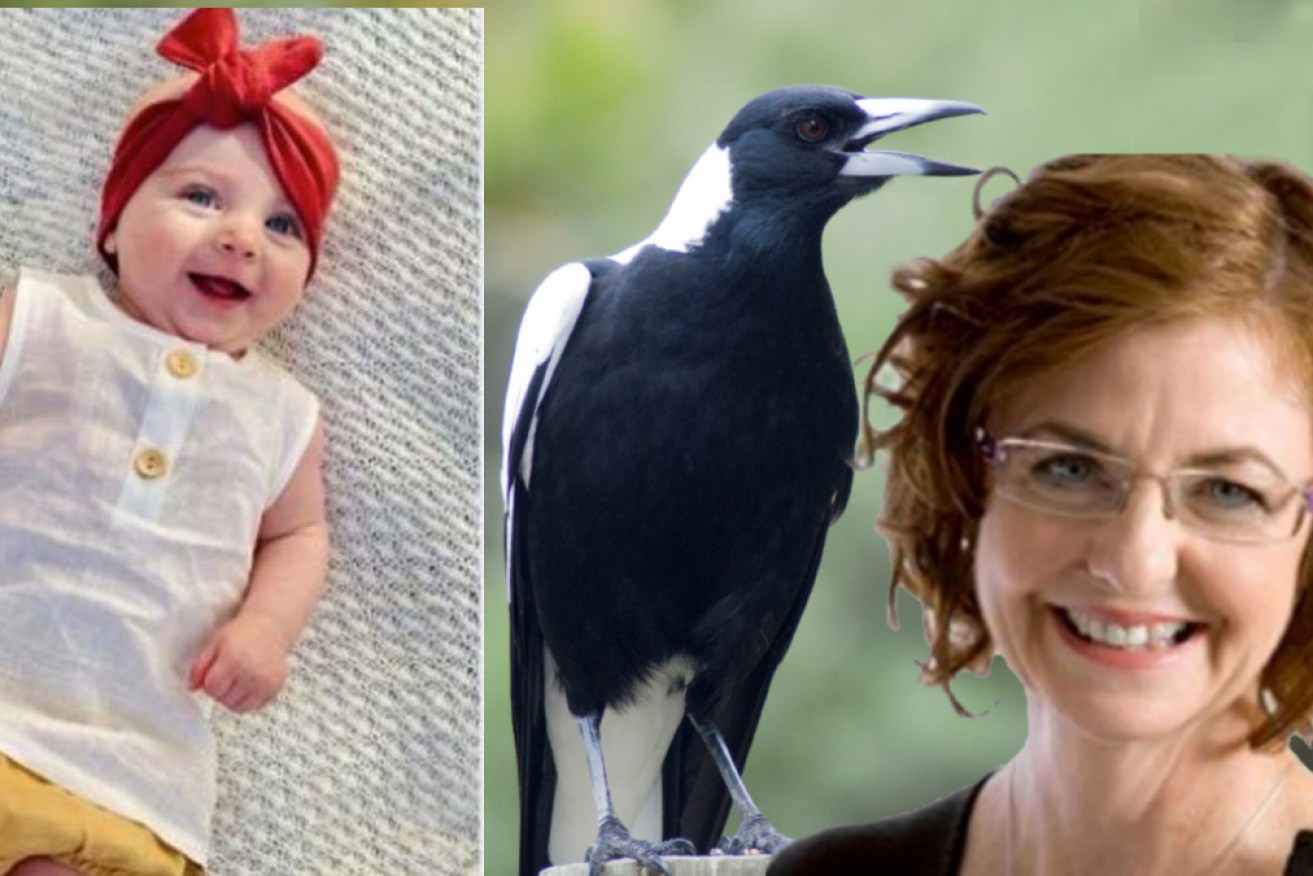Madonna King: Baby Mia’s death shows why we need a sensible solution for birds that attack


Baby Mia's tragic death must be a catalyst for change when it comes to managing birds, writes Madonna King. Image: TND
When I was a kid growing up in Central Queensland, we’d be made to wear ice-cream buckets on our heads to school.
My brothers and I would dawdle off, feeling protected from the magpies that made a vacant allotment in Roma their home for a couple of months each year.
On the back, Mum would paint a face – big eyes, a nose and a mouth – knowing that they would nosedive from behind, but aim for the back of the head.
I’m not sure if it worked or not. But this week, after a five-month-old Brisbane girl was killed as her mother ran from a magpie attack in a suburban park, the war waged on magpies needs to work.
Little Mia isn’t the only death caused by a 300-gram, nose-diving magpie.
A few years ago, a Queensland boy was killed when ran into the path of car while fleeing a nose-diving magpie.
And twice in the past 24 hours, I’ve seen cyclists, in an 800-metre radius from my house, almost killed as they swerved on a busy road to avoid their attacker.
Am I wrong to want revenge? To want to track down the magpie responsible for Mia’s death and ensure it doesn’t have the chance to hurt anyone else?
“No,’’ says one of the nation’s top magpie experts Professor Emeritus Darryl Jones from Griffith University. “That’s what anyone would think, especially when it involves children.’’
He says that bird, however, had the same perspective; it simply wanted to protect its children.
But when a dog attacks a child, it is taken away and put down.
When a shark takes a surfer as prey, it is hunted. When a crocodile takes the life of a swimmer, who has invaded its habitat, it is shot. Why are magpies so special?
They’re not, says Professor Jones, a behavioural ecologist.
Magpies were simply saved by calling city streets and suburban parks their home; it wasn’t feasible to start shooting birds out of trees, or as they chased cyclists down streets.
Professor Jones has a point there. But he says taking magpies away from their home territory – as long as it was more than 70 kilometres away – had the same effect. They’d never find their way back.
And that’s a good thing.
Baby Mia’s death should be a catalyst to do something.
In this Brisbane case, there had been numerous alleged complaints about the same magpie. In another local incident, the same magpie returns each year to wage war on four and five-year-olds walking to an inner-city school.
No one is saying magpies need to die (although before talking to Professor Jones that was my preferred position).
But authorities, responsible for heavily populated city areas, need to have a magpie management plan.
Parents and children – like Mia and her Mum – should be able to use a suburban park, without fear of attack.
This week, we’ve been saturated with cries that this is not the bird’s fault. That we have encroached on their natural habitat.
Rubbish. Shouldn’t a park, filled with kids swings and yoga lessons and walking tracks, be a young parent’s natural habitat?
And what about a busy city road? Are the magpie apologists suggesting we sell our homes, and leave the murderous magpies to move in?
We are not talking about ridding the nation of a bird some people love. Only about seven per cent of magpies “even look sideways at someone’’, according to Professor Jones.
The ferocity of attacks has not increased over time, and nor has the ‘attack’ season, which is the same from Hobart to Cairns each year.
Of that tiny fraction that attack people, about half will focus on pedestrians, and the rest are made up of “cyclist-only magpies and even postie-only magpies’’.
“They’ll hammer the posties up and down the street and not look at anyone else sometimes,’’ Professor Jones says.
And they’re clever. Although they will always come from behind, they may turn and aim for a cheek or an ear to avoid a cyclist’s helmet.
I saw that repeatedly yesterday.
The ice-cream bucket might not work any more.
But removing offending birds from city scapes and “relocating’’ them 70 kilometres away, research shows, will work.
It won’t bring Mia back. But it should be the simple and sensible policy we implement to prevent another family going through the hell Mia’s parents are now living.








